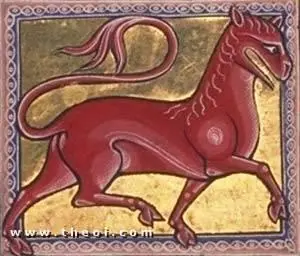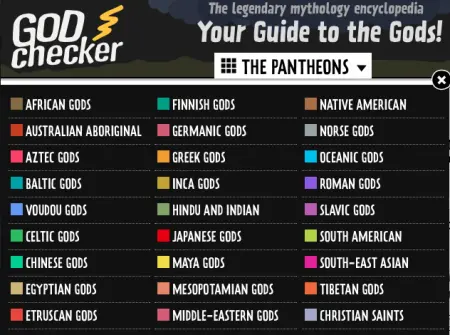In a recent article from The Guardian, writer David Shariatmadari bemoans journalists overusing the same allusions to Greek mythology when commenting on the current economic crisis in Greece. Of course, allusion is nothing new to the world of writing. It's one of the basic tools we can use to beef up the "literary merit" of our stories, or as a means of paying homage to other wonderful works of art that inspire us. And perhaps one of the biggest sources for allusion (both in terms of prevalence and in breadth of material to choose from) is Greek mythology. References to Zeus, Icarus, Apollo and Aphrodite appear everywhere, not just in news articles. Two deity-loaded publications immediately come to mind: Neil Gaiman's American Gods, and Pantheon Magazine, which is ran in part by LitReactor folk.
But if like Shariatmadari, you're keen on expanding your knowledge of deities and legends, here are some resources to help you find more obscure mythological figures for your writing. But please, always remember to use your allusion responsibly and not wade into the gnarly waters of cultural appropriation.
Note: I don't claim to be an expert in mythological studies, so if there are some good resources for this course of study I've missed, be sure to let us know in the comments section.
Edith Hamilton's Mythology: Timeless Tales of Gods and Heroes
Yes, I know, this is THE mythology book, the one you use in middle school as an introductory text to the Greek and Roman allegories. But if you leaf back through this text, it doesn't take long to find myths less prominent in our average, modern-day consciousness. For instance, in the section "The Lesser Gods of Olympus," Hamilton writes of Nemesis and Aidos, personified emotions "esteemed highest of all feelings in Homer and Hesiod." Hamilton's entry on this pair is brief, but further research on Theoi.com (more on this website in a moment) tells us that
Aidos, as a quality, was that feeling of reverence or shame which restrains men from wrong; Nemesis was righteous indignation aroused by the sight of the wicked living in undeserved good fortune.
I can imagine a plethora of narratives emerging from this relationship, either directly or indirectly referencing Aidos and Nemesis.
Theoi.com
Theoi is a massive online encyclopedia dedicated to Greek mythology. If you're totally in the dark, or if you just need to brush up, this is an excellent site to visit. On the main page, there's a handy index of links divided into categories such as "Greek Myth Intro" and "Greek Myth Bios." Within these list headers are further subcategories, including Gods & Spirits A - Z, Greek Star Myths, and my personal favorite, Bestiary of Creatures. There, you'll find all manner of fantastic beasts, including this guy:
Leucrocota, Aberdeen Bestiary manuscript © 1200, Aberdeen University Library. Courtesy theoi.com
The Leukrokottas, described as having
the body of a stag, a lion's neck, cloven hooves, and a wide mouth with a sharp, bony ridge in place of teeth. It had the ability to imitate the voices of men to lure prey.
GodChecker.com
If you're looking for information about more than just Greek mythology, head over to GodChecker.com, a site claiming to have "more Gods than you can shake a stick at." On the main page, there's a "Deity of the Day" info box, so simply dropping by the website might reveal an unknown God to you.
But of course, their database goes much deeper than this. Clicking on "The Pantheons" link at the top of the main page gives you a drop down list loaded with links to gods of numerous cultures.
Clicking at random can get you quite far at God Checker. Doing so, I learned about Benandonner, a Celtic fighting god, also known as The Red Man.
He was a fearsome beast of a giant with flaming red hair and an extremely burly beard. As you might imagine, he was not known for his placid nature.
One legend concerns Benandonner and Irish giant Finn-Maccool, who accepted a challenge from the former to a brawl. The Red Man single-handedly built a bridge across the sea, from Scotland to Ireland, but upon arriving for the fight, he was greeted by a giant baby. Fearing this to be the son of Finn-Maccool—and if the baby was this big, imagine how mighty the father must be—Benandonner fled, destroying the bridge as he went. But it turns out the baby was only Finn-Maccool in disguise.
Other Resources
Behind the Name
A great website for name etymology, Behind the Name also features a section dedicated to mythological monikers and their meanings. If you're looking for a name from antiquity with a particular quality for allusive purposes, this is a great place to start.
Wikipedia
Perhaps an obvious site to include here, but Wikipedia does contain some useful lists of gods and goddesses from around the world, including Mesopotamian and Anglo-Saxon deities. There's also a comprehensive page detailing monsters and spirits from Choctaw mythology, including information on Bohpoli, a "little man" of the forest who enjoyed throwing rocks at the trees to make strange noises, a harmless mischief aimed at the people of the tribe.
These lists really only scratch the surface of course, so be sure to jump down that rabbit hole sometime.
DeliriumsRealm
According to the "About" section on the main page,
DeliriumsRealm is devoted to the study of good and evil in society; specifically, what is the nature of evil and how has evil been defined and personified throughout history.
This area of concern includes a lengthy section devoted to demonology, particularly of the Judeo-Christian variety. We all know about Lucifer, but what about some of the other demons of Christianity? There are lots to choose from. Personally, I'm enamored by Lix Tetrax, mostly for its badass name, but also because the demon seems to be more or less a gremlin. He describes himself thusly:
I create divisions among men, I make whirlwinds, I start fires, I set fields on fire, and I make households non-functional.
Once again, if there are any resources that deserve mentioning, or if you just want to shout out your favorite god, monster, or demon, make your voice heard in the comments section below.

About the author
Christopher Shultz writes plays and fiction. His works have appeared at The Inkwell Theatre's Playwrights' Night, and in Pseudopod, Unnerving Magazine, Apex Magazine, freeze frame flash fiction and Grievous Angel, among other places. He has also contributed columns on books and film at LitReactor, The Cinematropolis, and Tor.com. Christopher currently lives in Oklahoma City. More info at christophershultz.com










